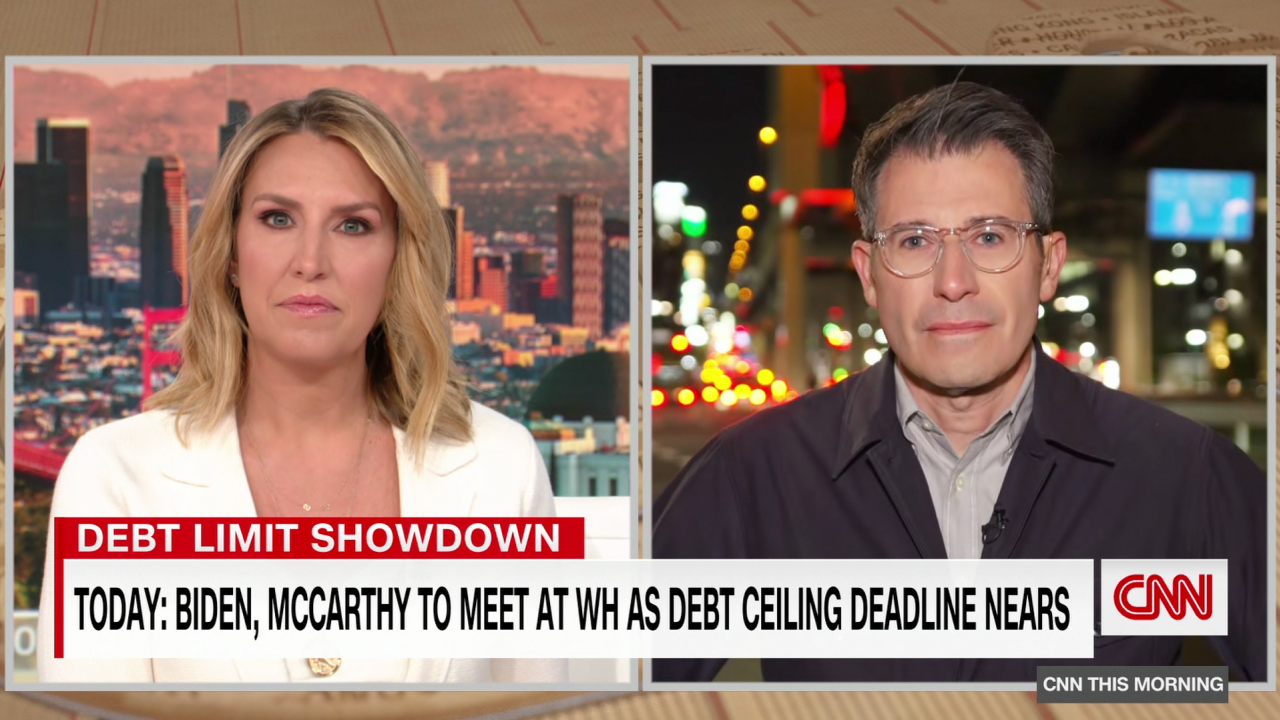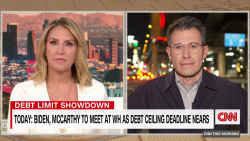A version of this story first appeared in CNN Business’ Before the Bell newsletter. Not a subscriber? You can sign up right here. You can listen to an audio version of the newsletter by clicking the same link.
Dire warnings about the economic chaos and catastrophe that will ensue if the US debt ceiling isn’t lifted soon abound. Still, markets remain rather sanguine about the Washington drama.
Don’t expect that to last much longer. Analysts say Wall Street has identified its own X-date in late May, and if there is no major movement in Congress by then, they expect some major market volatility.
What’s going on: The United States is running out of money, and if Congress doesn’t act to raise or suspend its self-imposed borrowing limit, the country could soon default on its bills.
That’s a really big deal. A default would, in the words of Treasury Secretary Janet Yellen, cause “an economic catastrophe.”
A lengthy default would wipe out about 8.3 million jobs and bring unemployment 5 percentage points higher, economists at the White House said last week. Even under a shorter default, the economy would suffer the loss of about half a million jobs and the unemployment rate would rise by 0.3 percentage points, they said.
The Treasury could run out of cash and extraordinary measures to pay all government obligations as soon as June 1, according to Yellen. That’s about three weeks from now.
Moody’s Analytics last week said that the United States could hit its default date on June 8, significantly earlier than its previous projection of August 18. Other, more conservative estimates, put the X-date in August.
Investors don’t appear to be panicking. Markets moved higher in after-hours trading Tuesday despite little progress being made towards a deal to raise the debt ceiling during an hour-long meeting between President Joe Biden and top congressional leaders. The major indexes were down slightly in pre-market trading Wednesday ahead of the CPI inflation report.
Markets react: There are a few reasons investors appear to be shrugging off this potential economic catastrophe.
First, they may not believe a default will actually happen — the debt ceiling was instituted in 1917 and since then the limit has been suspended or raised over 100 times, often with political drama attached. The debt ceiling crisis of 2011 caused Standard and Poor’s to downgrade US debt for the first time in history. In 2013 the country also came within days of defaulting.
“I think in the stock market in general there’s a feeling of the little boy who cried wolf: this will get solved at the last minute, which we’ve seen in the past,” Greg Valliere, chief US policy strategist for AGF Investments told CNN Chief Business Correspondent Christine Romans on Tuesday.
“But this is different,” he said. “I think the [Republican] militants in the House [of Representatives] are a new factor here and for the markets to be this sanguine to me is not warranted.”
Second, investors might be taking the crisis seriously but don’t know how to react to it, Gustavo Schwenkler, professor of finance at the Leavey School of Business at Santa Clara University, told me.
“There are so many ways this can go. It’s not quite clear how equity markets will react to this event because it’s just something that has never happened.”
Markets could be displaying a delayed reaction while investors wait for more information, he added.
Wall Street’s X-date: Analysts appear to be in agreement that the end of May is when investors will start to lose their cool.
Schwenkler says to expect “a lot more volatility” if debt ceiling issues don’t appear resolved by the last week of the month.
“You probably have another week or so” before investors get serious, Nicholas Bohnsack, president and head of portfolio strategy at Strategas, said Tuesday
In a note last week, JPMorgan Asset Management chief global strategist David Kelly also identified the final days of May as when equity market volatility will rise.
What comes next: If Congress fails to increase or suspend the debt ceiling in time, said Kelly, expect a “major stock market meltdown.”
But, he said, markets should be able to recover quickly. “It is best not to think of the debt-ceiling crisis as a potential rerun of the Great Financial Crisis,” he wrote.
“Restoring confidence in the US banking system in the wake of the subprime crisis was an immensely complicated and uncertain task. By contrast, recovery from a debt-default crisis would likely start the day Congress, belatedly, suspended the debt ceiling,” he added.
Big Business and the debt ceiling
Treasury Secretary Janet Yellen has been calling on CEOs and other business leaders to discuss the consequences of brinkmanship around the debt ceiling, reports my CNN colleague Matt Egan.
After months of relative silence, business advocates are beginning to speak out against the budgetary impasse.
“With the US at risk of defaulting on its obligations as soon as June 1, meaningful, bipartisan discussions on raising the debt ceiling can no longer wait,” Josh Bolten, chief executive of the Business Roundtable, wrote in a statement Tuesday.
“A default would deliver a severe blow to the economy, leading to widespread job losses, decimated retirement savings and higher borrowing costs for families, businesses and the government,” said Bolten.
Michael Hanson, chief lobbyist at the Retail Industry Leaders Association, said that retailers have been pounded by supply chain woes and the pandemic, and don’t need any more economic headwinds.
“What they crave more than anything is a period of relative calm and certainty after 3-plus years of managed chaos,” he wrote. “A misstep over the debt ceiling would subject businesses and consumers to an economic shockwave,” he added.
Neil Bradley, executive vice president of the US Chamber of Commerce, also said in a statement last week that “the full faith and credit of the United States government should never be placed at risk.”
Airbnb is a-ok
Recession fears are in the air but they have yet to reach Airbnb. The company reported strong revenue growth on Tuesday and even set a new record for bookings during the first three months of the year.
“More guests are traveling on Airbnb than ever before,” CEO Brian Chesky said on a call with analysts Tuesday. “We’ve seen our highest number of active bookers ever, despite continued macroeconomic uncertainties.”
“During the quarter, we also saw guests booking trips further in advance, supporting a strong backlog for Q2,” he added. “We were especially encouraged by the continued recovery of Asia Pacific as nights booked in Q1 increased more than 40% year over year.”
Despite the rosy earnings report, shares of Airbnb slid as much as 10% in after-hours trading Tuesday after the company reported a weaker outlook for the current quarter than some analysts had expected, reports my CNN colleague Catherine Thorbecke.


























